Is it necessary to install a gas leak detector: legal regulations and expert recommendations
Gas equipment has always been considered one of the most dangerous in terms of operation.At the same time, the use of gas in everyday life has become an integral part of housekeeping. Starting from cooking in small kitchens of Khrushchev-era houses and ending with heating huge country houses.
Unfortunately, most of the tragedies that have occurred in recent years are related to gas leaks. That is why the issue of installing a gas leak sensor has received such resonant significance, because previously the legislator did not oblige the mandatory installation of this device in the gas system communication.
In this article we will understand what a gas leak sensor is, why and where it is needed. We will also consider the current laws for 2019 regarding the installation of sensors, find out whether it is necessary to install a gas leak sensor, and analyze the advice of experts in this field.
The content of the article:
What is a gas leak sensor?
If detect gas leak Most often it is possible only by a specific smell, which often happens too often, then a gas leak sensor allows you to do this much earlier. It is designed to detect household gas particles in indoor air that exceed the permissible limit (in percentage).
Having detected an increase in gas concentration, the device informs the person about this with an audible signal. Also, modern sensors are equipped with the ability to additionally report this information to the gas service, which allows you to act quickly in situations when the owner of the apartment is not at home.
The design of the gas sensor includes a sensitive element that is triggered at the slightest deviation from the standard values of air composition.
It is important to remember that in practice, users often encounter cases of erroneous operation of a gas leak sensor. But do not ignore this signal and turn off the device in the future. In matters relating to gas equipment, it is better to play it safe once again and check that everything is working properly.
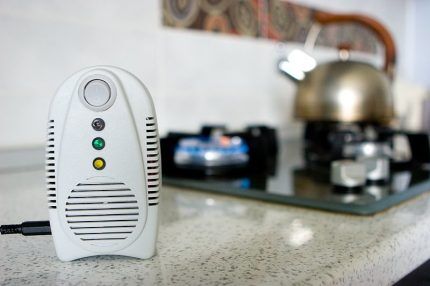
As for dimensions and installation, household gas analyzers are quite compact and can be placed anywhere.
Design and principle of operation of the device
Depending on the groups of gases being determined, the design of the device provides various types of sensors: optical, electromechanical, thermomechanical and others.
Main components in the sensor design:
- primary converterl, which determines the gas concentration in the surrounding space;
- measurement module, which compares the data received from the primary converter with the permissible rate of gas presence in space;
- actuating mechanism, which automatically shuts off the gas supply from the system;
- power supply, which ensures continuous operation of the sensor - usually a battery or an AC power supply.
All structural elements are assembled in a compact housing.
When the gas concentration exceeds the permissible value, the sensor element of the primary converter, which measures the composition of the surrounding air, changes its characteristics. This change becomes a signal for the measurement module, which, in case of deviation from the set values, gives a light/sound signal, as well as a command to shut off the gas (if it is a sensor with a shut-off valve), and turns on an alarm.
Main functions of a gas leak sensor
Next, let's talk about whether, in principle, a gas leak sensor is needed for domestic use.
So, based on the operating principle, the gas leak sensor performs the following functions:
- accident notification;
- automatic shut-off of gas supply using electromagnetic shut-off valves;
- turning on ventilation to extract air.
This is just a surgical intervention. Further actions to eliminate the leak must be carried out by gas service specialists. It turns out that such a sensor is very useful in everyday life.
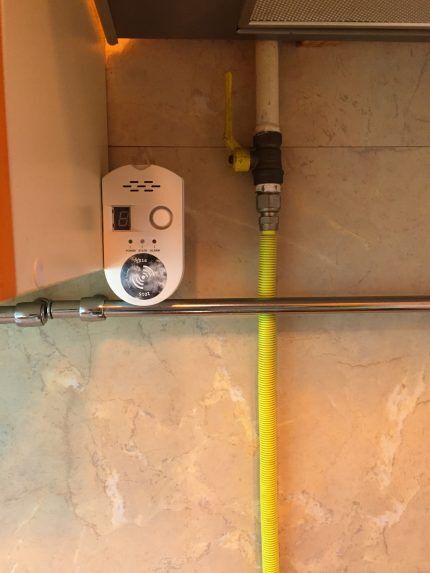
Who requires the installation of sensors and why?
First of all, the installation of gas leak detectors is necessary in order to reduce the amount explosions, fires and other emergencies. And, of course, reduce the number of victims.
It is for this reason that the mandatory installation of these monitoring devices was submitted to the State Duma for consideration at the beginning of this year.Justifying the availability of modern technologies in this area, the authors of the bill demand the development and universal connection of a gas monitoring system, which will automatically notify and shut off the gas supply in the event of emergency situations.
The bill was supposed to amend the articles Housing Code.
By the way, the solution to the problem of installing such systems should be provided using funds from the capital repair fund, the scope of which includes:
- elevator repair;
- repair of basements and roofs;
- repair and ensuring the normal functioning of in-house engineering systems.
The drafters of the bill suggest that sensors should be installed in basements with gas boilers and in kitchens.
As a result, the Housing Code did not change, but special Rules were developed and approved regulating the design of gas consumption systems in residential buildings. These rules have the abbreviation SP 402.1325800.2018 and came into force in June 2019.
In accordance with chapter eight of the rules, security must be carried out in accordance with the requirements specified in SP 4.13130.2013 And SP 7.13130.2013.
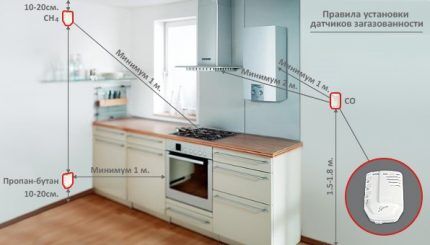
The same section indicates cases of mandatory installation of gas sensors:
- in blocked houses;
- regardless of the installation location when the power of gas equipment is more than 50 kW;
- in boiler rooms, which are located on the ground floors and in basements;
- in multi-apartment residential buildings;
- in boiler rooms that are located in apartment buildings and are intended for built-in or attached public premises;
- when placing gas-using equipment in apartment rooms.
For understanding, it is necessary to define gas-using equipment - these are systems in which gas is used as fuel. This applies to gas boilers, gas water heaters, stoves and other things.
However, based on point 4, we can conclude that it is necessary to use gas leak sensors in apartment buildings.
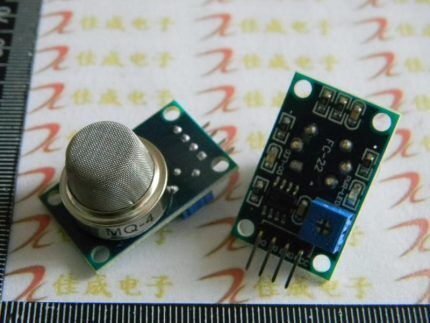
Thus, starting from June 2019, gas sensors must be used when designing new houses.
Mandatory installation of leak sensors
Regarding the issue of mandatory installation of household gas leak detectors, domestic legislation has not yet developed a law for residents of constructed apartment buildings.
The State Duma understands that implementing this project will require numerous costs:
- providing wages to employees installing gas analyzers;
- equipping with technical means that analyze the situation;
- equipment and personnel for rapid response;
- laying communications;
- necessary equipment for extinguishing and repairing gas systems.
Funds to resolve these issues will most likely be allocated from taxation funds, which in turn may lead to an increase in taxes on housing and communal services.
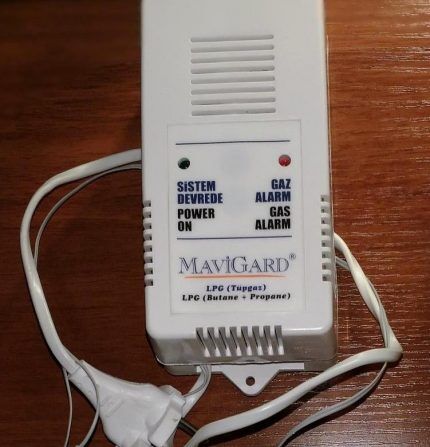
In the existing instructions for safe use of gas when solving municipal and household needs N 1614/pr., which came into force on December 5, 2017, the following obligations are imposed on all citizens of the Russian Federation who are owners of apartments and residential buildings:
- maintaining gas equipment in proper condition and cleanliness;
- maintaining the integrity of installed seals;
- gas consumers undergoing instructions on use.
However, there is not a single mention of the mandatory installation of a gas leak sensor. The installation or non-installation of this equipment is considered the prerogative of the homeowner.
Expert advice on choosing
One of the main issues that frighten gas consumers concerns the possibility of disconnecting the gas supply from communications and the imposition of fines for the absence of a gas leakage sensor. Lawyers can help answer the question about the need to install household gas sensors.
Thus, if there is an energy supply agreement and timely payment for gas supplies, there are no violations in the technical use of gas equipment and compliance with the requirements for its maintenance, the gas supplier does not have the right to stop supply.
The presence of a gas leak sensor in the kitchens of apartment buildings or in the kitchens of private houses in the case of using only a gas stove is not necessary.
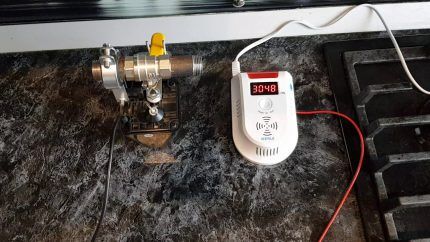
In accordance with Part 2 of Art. 16 Law No. 2300-1 “On the Protection of Consumer Rights” of February 7, 1992, it is prohibited to impose services, in this case, the mandatory installation of gas leakage sensors. Therefore, you should not unconditionally agree to the installation of this equipment under the threat of turning off the gas supply.
However, most experts in the field of gasification are categorical and believe that installing gas leak sensors is a necessary condition for ensuring life safety. They cite a number of European countries, such as Germany, Norway and Denmark, where the installation of sensors is mandatory.
According to statistics, the number of accidents associated with the consequences of gas leaks decreased by 85% after the introduction of mandatory installation of these devices.
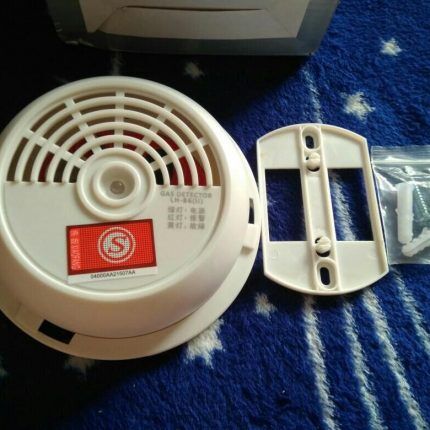
As for the sensor power type, you can choose wireless option or with mains power. The former are preferable, because they will be able to notify the owner of the danger even in the event of power outages.
If we talk about the quality and price category of the selected device, then there is no clear assessment.Of course, by choosing a more expensive copy, you not only get a more reliable and sensitive sensor.
But this option will have a number of additional functions:
- determination of critical gas concentration in air;
- prompt notification of emergency services about a gas leak;
- notification of the apartment owner via cellular communication.
Cheaper devices do not always do their job well. Often, sensors respond not only to gas leaks, but also to increased temperatures or increased concentrations of smoke and steam that are generated during cooking.
You don’t have a leak detector yet, but are you bothered by the persistent smell of gas in the room? We described in detail what to do and where to call this material.
Conclusions and useful video on the topic
To figure out how to install a gas leak sensor yourself, you can watch this video:
Are you still wondering whether it is necessary to install gas analyzers in a house or apartment at the present time and whether there will be a fine for their absence? The answer to this question is unequivocal - no. But, based on the above, it is worth noting that the installation of gas leakage sensors is mandatory when designing and building houses starting from July 2019. Also, the installation of gas analyzers is currently considered voluntary and in their absence, cutting off the gas supply to an apartment or house is prohibited. But, in the near future, changes in legislation are possible that will oblige the installation of sensors in every kitchen.
And in conclusion, it must be said that the gas leak sensor is primarily your safety. Its installation can prevent serious tragedies, since not all residents of apartment buildings always comply with operating rules for gas appliances.
What do you personally think about installing a gas leak sensor? Do you consider it an important element to prevent fires and explosions in the event of a leak? Or are such sensors just another scam for gullible users? Express your opinion, share your experience in operating sensors, take part in the discussion - the contact form is located below.



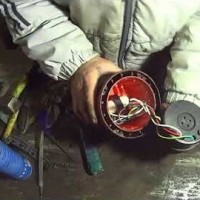
I paid for the project for the installation of a 24 kW double-circuit gas turbo boiler in a private block house. The city gas agency said that they would not put it into operation unless they ordered another project for the installation of an electromagnetic shut-off valve and analyzers (7700). Buy everything yourself, but a certain brand costs somewhere around 8,000, plus installation! In addition, these devices are subject to verification and the conclusion of a service agreement. Horror ! And you say - not necessarily!? They certainly don’t want to talk otherwise. In addition, for a kitchen of 10 sq.m. require an exhaust pipe with a diameter of 200 mm. Can you imagine such a hole in the ceiling or wall? This requirement does not fit into any standards or calculations. According to my calculations, the maximum pipe is 160 (and this cross-section is just 200 mm)! I dispute it, please show me the calculation. They replied that they would wait for the project =))) Well, I’ll wait, I won’t rush to break through the wall! Here's a closed combustion chamber for you...=))) Our officials and all sorts of research institutes attached to them take any good idea to the point of absurdity!
Hello!
Did you install it in Moscow time?
Currently, there is a Moscow government decree in force, which provides for the mandatory installation of a tightly closed door between the kitchen and the adjacent room as protection. This stupidity (there is no other way to say it) was used by Mosgaz JSC to blackmail me by refusing to replace a flexible hose for 1.5 years and accusing me of illegal redevelopment of the apartment. Two pensioners aged 80 had to go through 4 trials to prove that it was a lie.
This is a money scam. I myself am an adjuster and installer of electric vacuum production, but I can’t do it myself. They require documents for installation and commissioning. But can I draw up these documents for myself and even certify them with a seal (which one?). In addition, the number of connections has increased, which itself leads to an increase in gas leaks. A good idea can always be taken to the point of absurdity.
All draft “Rules” developed by various departments must be subject to mandatory public discussion and subsequent examination with the acceptance or reasoned rejection of proposals received during the discussion. The consumer who pays for ALL departmental requests MUST have the right to vote. True, this smacks of DEMOCRACY. And this is a dirty word...
In my project, gasification of a private house, a gas congestion alarm is provided, can I refuse this solenoid valve?